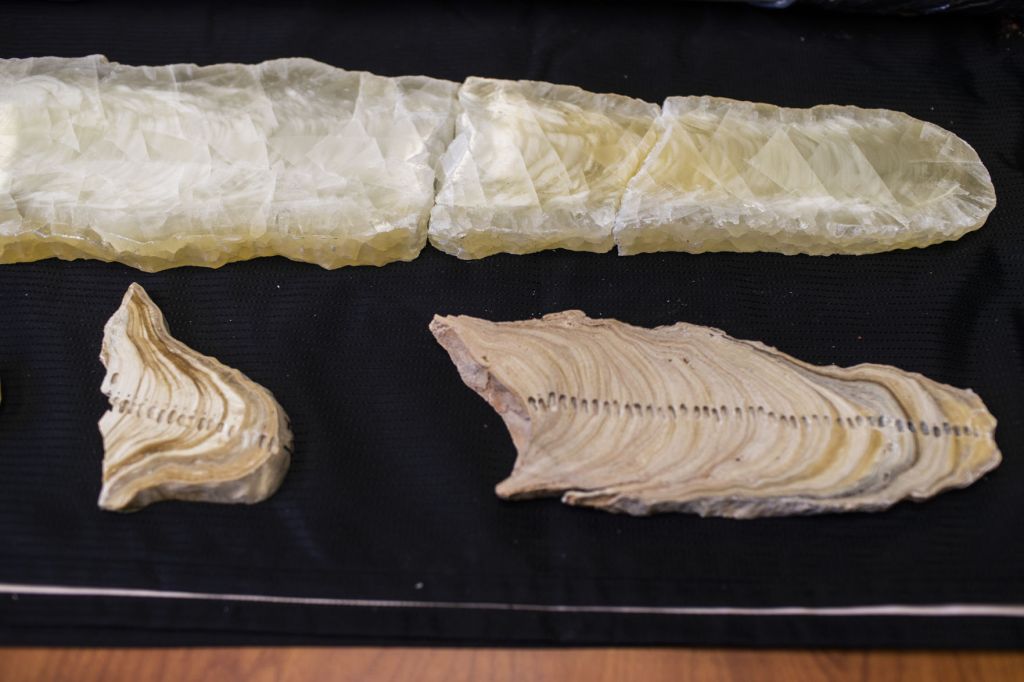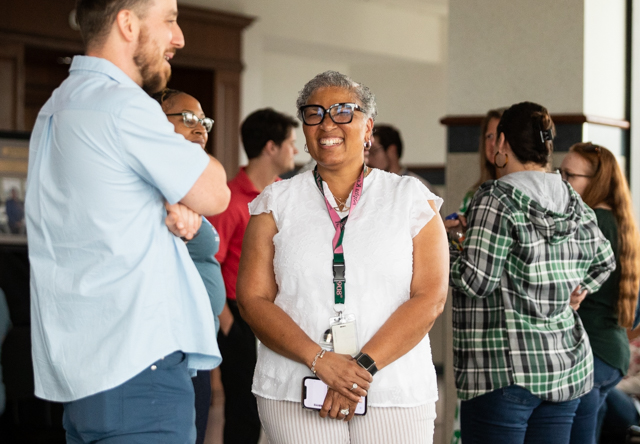WKU geoscientist selected to review major climate report
Published 6:00 pm Friday, August 16, 2019

- Cross sections of speleothems found in caves in Barbados and Curaçao on Friday, August 16, 2019, at his office in the Environmental Science and Technology building. (Austin Anthony/photo@bgdailynews.com)
Jason Polk, a young scientist and Western Kentucky University professor, studies the earth.
There’s the air, water, ice, soil and crust, their individual features such as glaciers, trees and rivers, and even tinier puzzle pieces like permafrost, vegetation and rock permeability that connect to form Earth’s climate system.
Trending
It’s because of the dedicated research by people like Polk that we understand what these pieces mean for life on Earth and why changes to this system matter.
Due to Polk’s unique expertise in climatology and caves, he was recently selected to review one piece of the Intergovernmental Panel on Climate Changes’ newest in-progress assessment, which will become the most comprehensive synthesis of climate change to date. It’s stockpiled with the latest established science, input and review from thousands of experts from across the globe, and it’s designed to help scientists, politicians, educators and everyday people understand the big picture of climate change.
“We can have all the science in the world, but if we can’t talk about it, it’s a fail,” Polk said.
The IPCC currently has five assessments, as well as methodology reports, technical papers and special reports on the various impacts of climate change. The sixth assessment, AR6: The Physical Basis, is expected to be released in 2021.
There will be hundreds of pages, but Polk is only reviewing part of one chapter. “Global Carbon and other Biogeochemical Cycles and Feedbacks” covers the topics of carbon and geochemical cycling, such as the trends of greenhouse gas concentrations. Polk, along with many other independent scientists, is inspecting eight pages of the latest data on methane, water vapor, nitrous oxides and carbon dioxide levels in the atmosphere.
Through this collaborative process, he’s become even more confident in the reports and their value to people.
Trending
“It’s an incredibly rigorous process that’s fact-checked and explained thoroughly,” Polk said. “It’s structured in a way that anyone can read it and decipher it. And anyone can download it.”
Polk was well-prepared for this task. He studied geoscience at the University of South Florida, where he developed a technique for measuring climate history through sediment deposits (basically, a parfait of dirt) from caves in Belize and Florida, before joining WKU in 2009.
While his geoscience research is diverse, it is his background in reconstructing the history of climate through environmental proxies within cave systems that makes him such a capable reviewer. In addition to utilizing sediment deposits, Polk studies climate history with speleothems, which is basically like viewing the tree rings from a stump but on the inside of a stalagmite.
“It’s like a time capsule,” Polk said, that can potentially peer back 500,000 years.
In his lab, he has slices of stalagmites that have various arching lines with different colors and opacities from caves around the world. In one stalagmite fragment from Barbados, Polk shaved every thousandth of a millimeter to get about 3,000 data points that cover the last 2,000 years of climate history. On the flip side, he drilled about every millimeter to see when these changes occurred during that time frame by dating the sample through analyzing the radioactive properties of uranium and thorium isotopes.
It was novel research when Polk was completing his Ph.D., but now it is becoming a mainstream method of studying climate history. The studies have been reproduced in different parts of the world and vetted against the other traditional climate proxies, such as ice cores, tree rings and pollen within fossils. And he helped lay the groundwork.
For his research, Polk has traveled to about 60 countries across Asia, Australia, Europe, South America and North America, and he’s been to less-frequented caves in New Zealand, Belize and Guatemala. He spends two to three months out of the country each year, often with his students.
He escorts sometimes dozens of students each year to other corners of the world to witness climate change in motion, such as melting glaciers in Iceland.
“If they go there, and they see a glacier melting with their own eyes … there, it becomes very real,” Polk said. “We try to create the curiosity. Otherwise, they don’t know to care.”
JT Troxell, a current WKU geosciences graduate student, has studied under Polk since his undergraduate days and traveled with him to Iceland, where he hiked on a glacier and explored an ice cave, where he saw firsthand the distinctive line in the ice from a 2010 volcanic eruption.
“I’ve spent quite a lot of time with him,” said Troxell, who is now studying karst hazards such as groundwater contamination, gas in caves and sinkhole collapses. “He’s a very modest person.
“He has so much going on anyway, between teaching and (directing the HydroAnalytical Lab) and working with the city, but he’s still a very understanding professor to work with.”
Fred Siewers, chairman of the department of geology and geography, expressed pride in Polk, who is the second scientist from WKU to review part of an IPCC report. The first was Rezaul Mahmood, who now teaches natural resource sciences at the University of Nebraska.
“I think it’s an honor for the department and for Jason Polk,” said Siewers, who described Polk as “critical” to the department for his leadership in coordinating the master’s program, helping students find valuable internships and working with the city of Bowling Green to conduct groundwater monitoring. “He’s been the director of numerous master’s theses, I’ve lost count at this point.”
Siewers, who has also studied proxies of earth’s past climate, thinks the IPCC report messages are becoming stronger and more urgent with each new release.
“It’s the issue of our time,” Siewers said. “It’s really important for people to understand science, to understand the need for action … and to understand it’s not too late.”
For Polk, these same worries keep him busy in the lab and teaching the next generation of problem solvers.
“It’s like pilots. If they mess up, they go down, too,” Polk said. “It’s the same for climate scientists.”







